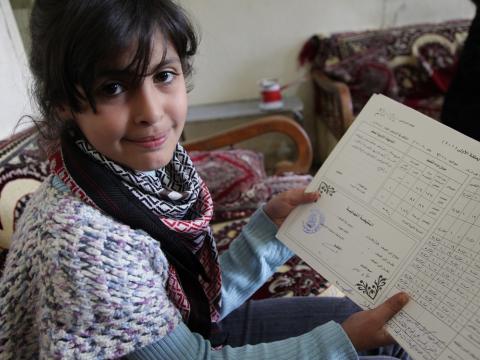Education provides hope for Syrian refugee children in Lebanon

"Don’t be scared, the bombs will not hit us." Those are not the words of a mother reassuring her child, those are the words of Jouri, an 8 year-old girl reassuring her mother while bombs were falling close to them in the Yarmouk area, in Syria.
Jouri is brave, but she and her two siblings were still frightened. She knew that with every bomb, people were dying. She used to count the sounds in her head, silently, so that her brother and sister would not be scared. "Every explosion meant that someone died," she says. "We saw the planes, some passed very close over our heads."
Yarmouk, a Palestinian camp inside Syria, became the scene of intense fighting and was heavily bombed last October; Jouri and her family are Palestinian, but were born and have lived all their lives in Syria. Jouri and her family had to run for their lives, leaving behind everything: their house, their business and Jouri's favourite place, her school.
"My school was big, it had two playgrounds with one swing and a lot of games," says Jouri. "The classrooms were coloured and I loved my teachers. I was very happy." But this year, Jouri was only able to attend three weeks of school in Syria before it was hit repeatedly.
"There were still unexploded bombs inside the school, we could not send our children there anymore," said Hala, Jouri's mother. Telling this news to Jouri was not easy, not only because she is a brilliant student, but also because she loves education and she is keen to do whatever it takes to continue it.
"When we first came to Lebanon, I started nagging over and over on my dad to register me in school, but he kept on telling me there is no place for me," adds Jouri.
The Lebanon Ministry of Education authorised its public schools to accept Syrian refugee children at the beginning of this academic year, but space is limited and the educational infrastructure is poor. Also, most of Syrian refugee children struggle with language difficulties because the Syrian educational curriculum is in Arabic, whereas the Lebanese system includes English and French. For Jouri, these hurdles would have been worth it, if it meant finding a place where she can learn.
World Vision has recently launched educational projects for Syrian refugee children. Over three months, 120 “out of school" children started receiving an accelerated learning programme to help enhance their educational attainment and readiness for enrollment in schools when possible. They have the chance to learn languages and other scientific courses.
Another 300 children aged between 9 and 14 years old from the Bekaa area, who got the chance to be enrolled in public schools but are having learning difficulties, will be supported with daily remedial classes, to help them fill the learning gap.
"The longer a child is out of school, the harder it is to catch up with his peers and their education overall," says Lara Lteif, education project coordinator. "Refugee children are among the most vulnerable to falling behind on the educational level which might cost them their future."
Jouri's aunt, who lives with them, heard of World Vision's educational project in the village where they are currently residing, and immediately registered Jouri and her seven-year old brother Khaled, eligible for this programme.
"Coming here [World Vision's educational project] is the best thing that happened to me since we [left Syria]," says Jouri who has been in Lebanon with her family for eight months but never complains about living with 16 other family members and relatives in a two bedroom, older apartment.
The change in the daily life of this family is enormous. They had to leave their newly constructed big house, and their own business to save their lives. They had a small garden where Jouri played with her cat, birds and goats. The father owned a small seamstress factory and that along with their house were hit by bombs.
Since they came to Lebanon, the father is not able to work; finding a job for a refugee in Lebanon is very difficult. Let alone a well paid job.
"I work the whole month for US $100," says Jouri's aunt. "It is barely enough for bread."
"The problem is that it is even difficult for Lebanese to find jobs, especially in winter," said one the Lebanese neighbours living next to them. "How can they hope to find better opportunities?"
Before the war in Syria began, Lebanon was already home to as many as 455,000 registered refugees from across the region. With a weakened economy and shrinking job market, the arrival of approximately* one million refugees brings greater competition to the market.
World Vision is continuing to support more than 60,000 Syrian refugees in Lebanon with food vouchers and educational programmes.
For now, being in school is giving Jouri and other children hope they need to survive these tough times.